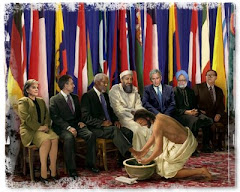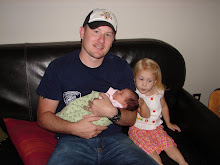Just found Greg Boyd's (wrote Myth of a Christian Nation) blog, and ran across this post. Thought I would share, as it is fantastic, and "hard to hear" or some might say - challenging.
"Hi folks,
I took Wednesday off from the Science and Theology conference to fly out to Washington D.C. and participate in a one day Conference on Faith and Politics, alongside Jim Wallis, Tony Campolo, and Melissa Rogers. It was sponsored by Christian Faith and Ethics Today and The Cooperative Baptist Fellowship (which includes 14 different Baptist organizations). About 400 Baptist leaders were present.
We had a wonderful time! Several people told me afterwards that they felt it was the most engaging and animated conference they'd ever attended. (One gentleman who told me this was around 70 years old and said he'd been going to conferences like this all of his life!) We all presented our views with passion, yet there was a discernable mutual respect and love that permeated the conference. Honestly, I love these folks. (And Tony is hands down the best speaker in America!)
Afterwards we all went out for dinner. We got into some very good, always friendly, debates. When I had to leave to catch a plane, I told them very sincerely I wished we had five hours to continue because it was so stimulating, challenging and informative. I honestly was pressed on points I need to think deeply about, and I appreciated this. Melissa (who is a legal expert on church and state relations and a fantastic speaker!) suggested we (and perhaps other like-minded leaders) arrange to do this once a year, and everyone seemed open to the possibility. We'll see.
Anyways, there's a trillion issues I could discuss, but I'll just briefly discuss my take on one. (The word "briefly" in this sentence is used in an Einsteinian sense: It's very relative.)
The four of us all agreed passionately that the most important thing disciples of Jesus can do to further the Kingdom isn't about politics; its about HOW WE LIVE. Furthermore, we all agreed that the Church needs to take responsibility for poverty, homelessness, racism, and all manner of social ills, and that we shouldn't wait on government to do any of this. And we all agreed that the only authority the Church has to speak to anyone is the moral authority it earns by sacrificing for others. (Tony was especially eloquent in his talk about this.) Where we disagreed was that Tony, and even more so Jim, believe that we must also invest energy in being "the conscience of government," holding it accountable to do the right thing. (I'm not sure where Melissa stands on this).
There's six things I'd say in response to this position (most, but not all, of which I expressed in my talk and in our dinner conversation).
1. I think it's EVERY decent person's job to "hold the government accountable." The criteria for good politics isn't Christian faith or self-sacrificial love, but common decency that promotes the common good. There's nothing distinctly Christian about holding a government accountable. Nor does being a Christian give one any special moral insight or wisdom into what government should do about various social ills. What being a follower of Jesus SHOULD do -- and this is our one distinctive -- is that we should be more willing to sacrificially serve others. So, I believe, our focus as Kingdom leaders should be on motivating and mobilizing Christians to sacrifice, not motivating and mobilizing them to vote "right."
2. Tony repeatedly appealled to the paradigm of the prophet going before the King and saying prophetically, "Thus says the Lord..." But this paradigm is rooted in the Old Testament in which both the King and the prophet were under the Israelite covenant. The JOB of the prophet under this covenant was to hold the King (and others) accountable. But America isn't Israel. It makes no more sense in America (or any other country) to proclaim "Thus says the Lord" to the President or Congress than it does to say this to a stranger on the street. Why should they care about what "the Lord" says -- or about what you or I THINK the Lord says? This is why Jesus never challenged Pilate or Caesar, though they were by any standards both very, very bad leaders.
3. I agree in a sense that Kingdom people can function as the "conscience of governement," but it's not by our WORDS, but by our LIFE. The unique Kingdom way to function as the conscience of government is simply by BEING THE KINGDOM -- which means, LOOKING LIKE JESUS. If the Church would sacrificially care about the poor, the homeless, the economically and racially oppressed, etc… it would cast a light on government that would expose its inadequate attention to these issues, just as Jesus exposed the ugliness of earthly governements (and the demonic power behind them, cf. Lk 4:5-7) by allowing himself to be crucified as he entered into solidarity with sinners.
I suspect the reason many if not most American Christians default to political power is because the Church in America is so far from being this kind of "conscience" that most can't even imagine it. Because of the Church's lack of Christ-like sacrificial power, the only kind of power most Americans see is "power over" others -- that is, political power. So they sadly think the Church needs to acquire as much of this kind of power as possible. As I argued in The Myth of a Christian Nation, the quest for this kind of power has always, and will always, destroy the Church. Our only authority is the Cross, not the Sword. And when we pick up the Sword, we put down the Cross.
4. Here's a big one. At dinner I argued with Jim and Tony that if we agree that our only authority to speak to governements or to anyone else is the moral authority we earn by sacrificially serving others, and if we agree (as we do) that the Church isn't remotely close to having this moral authority in western culture, then, I said, doesn't it make sense for us to BE QUIET about politics and put all our energies into motivating and mobilizing the church to be the Jesus-looking kingdom we're called to be in order to perhaps someday gain this authority? And if the Church ever did win this broad respect such that people and government actually cared about our opinions, then we wouldn't have to demand it. It would come naturally. (Moral authority, I believe, can NEVER be demanded. It must be earned).
On the other hand, when we speak into politics without this moral authority, we are heard simply as one of the many political voices trying to enforce our wills on others through the power of law. We're just another "power-over" special interest group. So, shouldn’t we simply "Seek first (to be) the Kingdom of God, and (trust that) all these things (include a voice in steering society) will be given unto you" (Mt 6:33)?
5. On top of this, what business does the Church have trying to get Caesar to act more Christian than we ourselves act? How can we possibly tell Caesar what he should do about the poor when we ourselves are not bleeding as much as we can bleed for the poor? The Church can have a role in leading government, I believe, but only if it does so BY EXAMPLE, not cheap opinions.
Until we ARE this example, I honestly think its counter-productive to the Kingdom to offer public opinions "in Jesus name." It's like those Christians who publically rally Christians to be against gay marriage because they're for family values, when Christians themselves have a higher divorce rate than the rest of America. This sort of thing invites the charge of hypocrisy. Of course, individuals can have whatever opinions they want about gay marriage or any other political issue. The trouble arises when groups publically represent this as "the Christian position." If Christians spent a decade doing nothing but healing their own marriages while sacrificially serving non-Christian gay people, maybe, just maybe, we'd earn the right to lovingly speak into their lives -- and they into ours (since, after all, our sin is like a tree trunk compared to their sin, which is a mere dust particle [Mt 7:1-3]).
6. Finally, my deepest worry is always about the demonic pull of politics. I think the devil loves it when we become so entangled in trying to get Caesar to do what we think he should do that we compromise our Kingdom call to do the one thing WE'RE supposed to do; namely, all the things we're trying to get Caesar to do! We can become so entangled with trying to steer politics that we don't get around to simply BEING THE CHURCH.
I suspect the devil especially loves it when we become divided over what Caesar should do -- as is inevitable once we become preoccupied with the politics Caesar, instead of the Kingdom of Christ. When this happens, we can't as a united front sacrifice together to be the Kingdom. The Matthews and Simons among us become so divided over whether the Democratic or Republican program is the best one to address injustice (or whatever) that we can't unite together to sacrificially do something in Jesus' name about injustice.
Again, we had a wonderful time together, and the conversation will continue. But in the meantime, may I encourage all of us to not wait on the outcome of this discussion, or of ANY discussion. Starting now, JUST BE THE KINGDOM. Unite with other disciples and live in the question: How can we bleed together to manfiest God's love to others?
How you vote isn't going to change the world. How you LIVE will. God promises it.
Blessings"
Saturday, July 7, 2007
Subscribe to:
Post Comments (Atom)



No comments:
Post a Comment